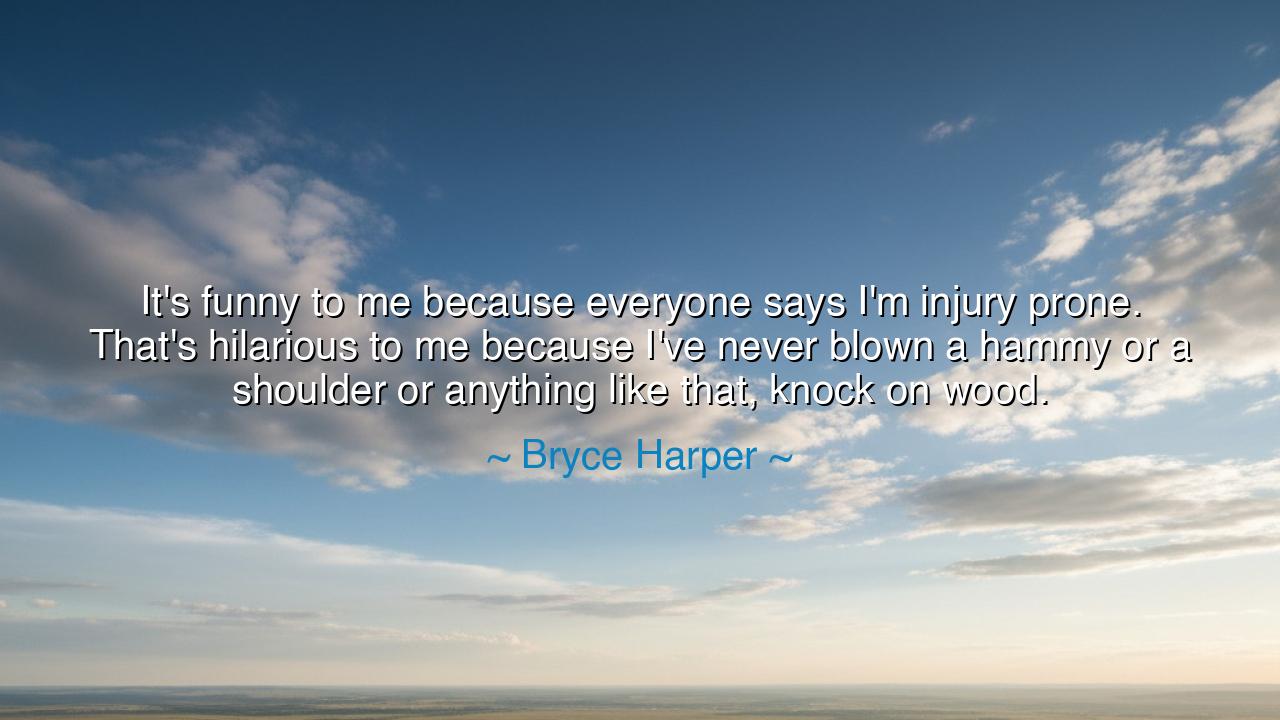
It's funny to me because everyone says I'm injury prone. That's
It's funny to me because everyone says I'm injury prone. That's hilarious to me because I've never blown a hammy or a shoulder or anything like that, knock on wood.






“It’s funny to me because everyone says I’m injury prone. That’s hilarious to me because I’ve never blown a hammy or a shoulder or anything like that, knock on wood.” Thus spoke Bryce Harper, a warrior of the diamond, one whose fire and ferocity have made him both feared and misunderstood. His words, though filled with humor, reveal a truth that reaches far beyond the realm of sport—a truth about perception, resilience, and the gulf between how others see us and how we know ourselves. Harper, in jest, defends not merely his body, but his honor, declaring that labels do not define the spirit of the one who endures.
When he says, “It’s funny to me,” we sense the laughter of one who has grown used to the world’s misconceptions. The crowd, fickle and impatient, speaks quickly and loudly. To them, one stumble becomes weakness, one setback becomes destiny. But Harper’s laughter is that of the seasoned soul who knows better. He finds humor in false judgment, for he has learned what the ancients taught: that the opinions of the multitude are as shifting as sand, and that only steadfastness within can preserve truth. To laugh in the face of rumor is the mark of one who has made peace with imperfection, and who answers scorn not with anger, but with confidence.
The origin of this wisdom lies in Harper’s journey—a career marked by brilliance and scrutiny in equal measure. Since youth, he has been cast as a prodigy, a force of nature, a lightning bolt in human form. And yet, such brilliance attracts both light and shadow. Every bruise became a headline; every slide into the dirt, a prophecy of downfall. But what he reminds us here is that the story others tell about us is not always the story that is true. “I’ve never blown a hammy or a shoulder,” he says, a statement both literal and symbolic. For though his body may bear the scars of battle, his spirit remains unbroken.
The ancients, too, spoke of this resilience. The Stoic philosopher Epictetus taught that men suffer not from what happens to them, but from how they interpret what happens. To be called “injury prone” is, in essence, to be misunderstood—to be judged not for one’s essence, but for the accidents of fate. Harper’s laughter becomes the Stoic’s shrug; he refuses to let false narratives become chains upon his mind. His jest—“knock on wood”—is half superstition, half prayer, but entirely human. It reveals humility within strength, the quiet recognition that even the most gifted stand at the mercy of fortune.
Consider also the ancient warrior Achilles, the mightiest of the Greeks. Though his body was nearly invincible, he bore one weakness, and that flaw defined him in legend. The poets called him immortal, yet fragile, godlike, yet doomed. Harper’s words echo this timeless tension: the acknowledgment that even strength invites scrutiny, and even greatness carries risk. But unlike Achilles, Harper refuses the curse of fatalism. His humor, his self-awareness, his defiance—all serve as armor against the world’s attempt to reduce him to a single flaw. He stands as his own narrator, laughing at fate rather than fearing it.
There is another lesson hidden within his laughter: the danger of labels. To call someone “injury prone,” “fragile,” or “reckless” is to imprison them in expectation. Humanity has long suffered under such names—heroes branded as madmen, visionaries dismissed as fools, the strong mistaken for stubborn. Harper’s amusement reminds us that the wise do not accept such chains. They know that the truth of a person lives not in the words of others, but in the consistency of their deeds. The one who returns, again and again, to the field, to the work, to the dream—that one defines themselves.
So, dear listener, take from Harper’s laughter a deeper courage. When others misunderstand you, smile—not in arrogance, but in strength. Let their judgments become your jest, not your burden. Stand firm in your truth, and “knock on wood” if you must, but never surrender to the stories others write about you. Remember that even the mightiest fall, but only the brave rise laughing.
For as Bryce Harper teaches, the measure of resilience is not found in the absence of wounds, but in the refusal to be defined by them. Laugh in the face of doubt, endure in the face of misjudgment, and let the world’s noise become your music. For in the end, it is not the crowd’s opinion that endures—it is the heart that keeps rising, undefeated, beneath the scars.






AAdministratorAdministrator
Welcome, honored guests. Please leave a comment, we will respond soon